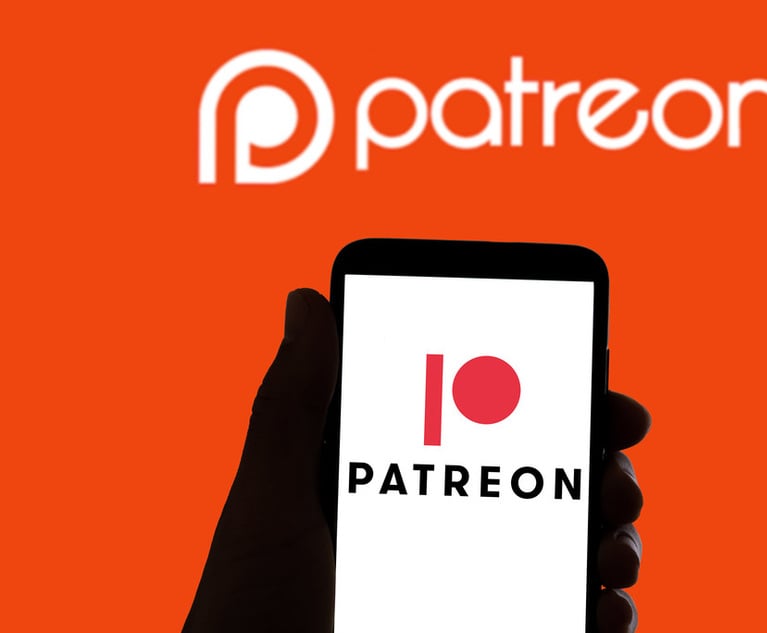VirnetX Stock Gets a Jolt From Federal Circuit Arguments in Apple Appeal
The IP holding company's stock popped 65 percent Tuesday as Paul Hastings and MoloLamken sought to preserve a $440 million patent infringement judgment against Apple.
January 09, 2019 at 10:44 PM
6 minute read
The original version of this story was published on National Law Journal
 U.S. Court of Appeals for the Federal Circuit Chief Judge Sharon Prost. June 10, 2014. Photo by Diego M. Radzinschi/THE NATIONAL LAW JOURNAL.
U.S. Court of Appeals for the Federal Circuit Chief Judge Sharon Prost. June 10, 2014. Photo by Diego M. Radzinschi/THE NATIONAL LAW JOURNAL.
It may be months before the U.S. Court of Appeals for the Federal Circuit resolves a $440 million patent dispute between Apple Inc. and VirnetX Inc. Yet the stock market declared VirnetX the winner of Tuesday's oral arguments.
Publicly traded VirnetX Holding Corp.'s stock price spiked 65 percent on Tuesday, with most of the increase occurring during the 2 hours and 15 minutes of hearings. (The stock gave back about half of those gains on Wednesday.)
Apple is appealing a $302 million jury verdict from the Eastern District of Texas that grew to $440 million with enhanced damages, costs, attorneys fees and interest. VirnetX is defending the judgement while challenging a series of PTO actions brought by Apple and other entities that invalidated claims from the four patents at issue, which relate to secure online communications.
VirnetX's stock price dipped slightly during the first five minutes of Paul Hastings partner Naveen Modi's presentation, which focused on the timeliness of Apple's joinder in the PTO proceedings. But once Judge Kimberly Moore told Modi she found the Patent Trial and Appeal Board's rationale for invalidating one of the patents “incomprehensible,” VirnetX's stock price began soaring.
The ascent continued as Moore broached the idea of sending the case back to the PTAB while disqualifying Apple from further participation, with Chief Judge Sharon Prost later throwing shade on Apple's challenge to VirnetX's damages theory.
“Let's assume for the sake of argument that we decide to remand this case,” Moore told Wilmer Cutler Pickering Hale and Dorr partner Mark Fleming. “Does that foreclose Apple's participation on remand?”
Fleming argued Apple is properly joined to the PTAB proceedings. But even if it isn't, he said there's no harm to VirnetX because the board limited Apple to the same invalidation arguments raised by the original PTAB petitioner, a hedge fund called The Mangrove Partners Master Fund Ltd.
Tuesday's arguments touched on a series of hot-button issues in patent practice, ranging from damages apportionment, to the participation of real parties in interest at the PTAB, to whether the courts must to defer to the PTO's interpretation of the America Invents Act.
The saga dates to 2010, when VirnetX sued Apple in the Eastern District of Texas and won a $368 million jury verdict. The Federal Circuit affirmed the validity of VirnetX's patents in a 2014 opinion, but sent the case back due to claim construction issues and VirnetX's failure to apportion the damages for the value of the patents.
A retrial resulted in the $440 million judgment. (Another jury has since awarded an additional $503 million based on newer Apple products, though that award remains pending appeal.)
In the meantime, Apple tried to challenge the validity of the patents under the inter partes review procedures established in 2012 by the America Invents Act (AIA). But the PTAB ruled Apple's petitions untimely, because the AIA requires parties who've been sued to petition within one year of the lawsuit.
Other entities then began filing petitions, with VirnetX complaining that they are front groups doing Apple's bidding. The PTAB rejected RPX Corp. petitions when discovery showed that Apple had paid it $500,000 just before they were filed. But the Mangrove Partners petitions got the green light, and Apple was allowed to participate under the PTAB's joinder rules. VirnetX, backed by biotechnology and pharmaceutical trade associations as amici curiae, said the PTAB is misreading the AIA and giving accused infringers and end-around the timeliness requirements.
“It's our belief that Mangrove was working with RPX here,” Modi told Moore on Tuesday, “and as your honor knows, RPX filed petitions working with Apple.”
But Moore and Chief Judge Sharon Prost pointed out that the PTAB limited Apple to the same arguments made in Mangrove's petition. “The problem is I don't see the prejudice,” Moore said.
Modi argued that Apple had “taken over” the IPR, and pointed out that the company's lawyers were arguing before the Federal Circuit on Tuesday.
That didn't appear to sway the court. But the judges clearly had issues with the PTAB's decision on the merits for at least one of the patents. Before Fleming could complete a sentence Prost cut him off.
“There are problems in the board's opinion,” she told him. “I mean, just getting through and trying to understand what they did was kind of challenging.”
Fleming argued that was due to VirnetX's “very broad” patent claims and its confusing arguments. But Moore didn't sound persuaded. She called the board's reasoning “sloppy” and “not clear.”
The question then seemed to come down to what role Apple will play if the Federal Circuit vacates and remands the Mangrove IPRs to the PTAB. Fleming seemed to anger Moore when he argued that VirnetX's interpretation of the AIA joinder rule is unreasonable. “Because it's quite frankly my interpretation,” she told him. “So it's surprising that you would stand here and tell me that you personally do not believe that it's at all reasonable.”
“I obviously don't mean to suggest your honor that you are being unreasonable, if that is your view of things,” Fleming answered.
Moore later praised Fleming for being creative, and asked him if Apple would be willing “not to participate and back out of the petition” if the case is remanded. “The point is you're probably going to force us to decide the joinder issue, because if we don't agree with you on the merits, it has to go back,” she told him.
Fleming said he believe Apple could continue participating under the parameters previously set by the board.
Meanwhile, Wilmer partner William Lee argued that VirnetX had made the same error as in the first trial by failing to apportion damages, and by relying on other VirnetX licenses that aren't comparable.
Prost told Lee that his arguments might be very good. “If I had been on the jury maybe I would have bought them,” she said. “But isn't that a question for the jury? Aren't our hands tied in what we can do with that?”
“This is all weight,” Moore told him. “It's not admissibility.”
Lee wound up using about 35 of the 48 minutes allotted for the damages argument. At Moore's prompting, MoloLamken partner Jeffrey Lamken, who argued damages for VirnetX, submitted after 12 minutes.
The cases are VirnetX v. The Mangrove Partners, VirnetX v. Apple and VirnetX v. Cisco Systems.
This content has been archived. It is available through our partners, LexisNexis® and Bloomberg Law.
To view this content, please continue to their sites.
Not a Lexis Subscriber?
Subscribe Now
Not a Bloomberg Law Subscriber?
Subscribe Now
NOT FOR REPRINT
© 2025 ALM Global, LLC, All Rights Reserved. Request academic re-use from www.copyright.com. All other uses, submit a request to [email protected]. For more information visit Asset & Logo Licensing.
You Might Like
View All
'A Death Sentence for TikTok'?: Litigators and Experts Weigh Impact of Potential Ban on Creators and Data Privacy

‘Extremely Disturbing’: AI Firms Face Class Action by ‘Taskers’ Exposed to Traumatic Content
5 minute read

Patreon Hit With Lawsuit for Allegedly Diverting Subscriber Data to Meta
Trending Stories
- 1'A Death Sentence for TikTok'?: Litigators and Experts Weigh Impact of Potential Ban on Creators and Data Privacy
- 2Bribery Case Against Former Lt. Gov. Brian Benjamin Is Dropped
- 3‘Extremely Disturbing’: AI Firms Face Class Action by ‘Taskers’ Exposed to Traumatic Content
- 4State Appeals Court Revives BraunHagey Lawsuit Alleging $4.2M Unlawful Wire to China
- 5Invoking Trump, AG Bonta Reminds Lawyers of Duties to Noncitizens in Plea Dealing
Who Got The Work
J. Brugh Lower of Gibbons has entered an appearance for industrial equipment supplier Devco Corporation in a pending trademark infringement lawsuit. The suit, accusing the defendant of selling knock-off Graco products, was filed Dec. 18 in New Jersey District Court by Rivkin Radler on behalf of Graco Inc. and Graco Minnesota. The case, assigned to U.S. District Judge Zahid N. Quraishi, is 3:24-cv-11294, Graco Inc. et al v. Devco Corporation.
Who Got The Work
Rebecca Maller-Stein and Kent A. Yalowitz of Arnold & Porter Kaye Scholer have entered their appearances for Hanaco Venture Capital and its executives, Lior Prosor and David Frankel, in a pending securities lawsuit. The action, filed on Dec. 24 in New York Southern District Court by Zell, Aron & Co. on behalf of Goldeneye Advisors, accuses the defendants of negligently and fraudulently managing the plaintiff's $1 million investment. The case, assigned to U.S. District Judge Vernon S. Broderick, is 1:24-cv-09918, Goldeneye Advisors, LLC v. Hanaco Venture Capital, Ltd. et al.
Who Got The Work
Attorneys from A&O Shearman has stepped in as defense counsel for Toronto-Dominion Bank and other defendants in a pending securities class action. The suit, filed Dec. 11 in New York Southern District Court by Bleichmar Fonti & Auld, accuses the defendants of concealing the bank's 'pervasive' deficiencies in regards to its compliance with the Bank Secrecy Act and the quality of its anti-money laundering controls. The case, assigned to U.S. District Judge Arun Subramanian, is 1:24-cv-09445, Gonzalez v. The Toronto-Dominion Bank et al.
Who Got The Work
Crown Castle International, a Pennsylvania company providing shared communications infrastructure, has turned to Luke D. Wolf of Gordon Rees Scully Mansukhani to fend off a pending breach-of-contract lawsuit. The court action, filed Nov. 25 in Michigan Eastern District Court by Hooper Hathaway PC on behalf of The Town Residences LLC, accuses Crown Castle of failing to transfer approximately $30,000 in utility payments from T-Mobile in breach of a roof-top lease and assignment agreement. The case, assigned to U.S. District Judge Susan K. Declercq, is 2:24-cv-13131, The Town Residences LLC v. T-Mobile US, Inc. et al.
Who Got The Work
Wilfred P. Coronato and Daniel M. Schwartz of McCarter & English have stepped in as defense counsel to Electrolux Home Products Inc. in a pending product liability lawsuit. The court action, filed Nov. 26 in New York Eastern District Court by Poulos Lopiccolo PC and Nagel Rice LLP on behalf of David Stern, alleges that the defendant's refrigerators’ drawers and shelving repeatedly break and fall apart within months after purchase. The case, assigned to U.S. District Judge Joan M. Azrack, is 2:24-cv-08204, Stern v. Electrolux Home Products, Inc.
Featured Firms
Law Offices of Gary Martin Hays & Associates, P.C.
(470) 294-1674
Law Offices of Mark E. Salomone
(857) 444-6468
Smith & Hassler
(713) 739-1250






